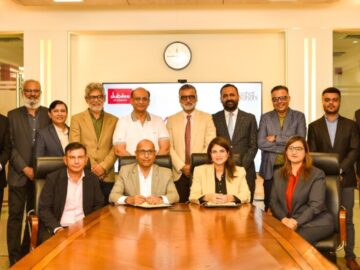
With support from the United Nations Development Programme (UNDP), the United Nations Population Fund (UNFPA), the Health Services Academy, the Ministry of Health and Health Department & Government of Balochistan, Sehat Kahani has inaugurated the first of its kind Tele-ICU project in Balochistan.
The Tele-ICU project will enable critical care specialists to provide virtual advice to public and private intensive care units (ICUs) across Pakistan. This project aims to increase the capacity of healthcare providers working in public and private ICUs across the country. Currently, there exists only a limited number of Critical Care Consultants in Pakistan; this intervention will allow improved patient care, particularly for those residing in far-flung areas where healthcare systems are inadequate. This project is an effort to build a more equitable and resilient society and contribute to improving the lives of the people of Pakistan.
The event was inaugurated by Mr Hayat Kakar (Special Secretary, Health Department, Government of Balochistan), Mr. Zulfiqar Durrani (Head of Office, UNDP Sub-Office Balochistan), Dr Rasheed Ahmed (Humanitarian Programme Analyst UNFPA), Ms Farkhanda Aslam (IDSP Representative) and, Dr Sara Saeed Khurram (Co-Founder and CEO Sehat Kahani).
Sehat Kahani will provide the required training for up to 500 doctors and 500 nurses across ten hospitals in Balochistan, including areas like Pishin, Killa Saifullah, Sibbi, Jaffarabad, Khuzdar, Loralai. To kick-off the training, Sehat Kahani will work with Sheikh Khalifa Medical Complex Quetta and FJ Hospital Quetta.
Speaking at the launch, Mr Zulfiqar Durrani, Head of Office, UNDP Sub-Office Balochistan said, ‘The Tele ICU project is a new and innovative initiative which can help address some of the healthcare challenges of Balochistan. Keeping in view the area of the province (44 per cent of Pakistan), provision of health services in far-flung areas of Balochistan has always been a struggle for the government. We hope that this pilot initiative will pave way for expanding the telemedicine approach in the province through the Government of Balochistan’s resources.’
Dr. Rasheed Ahmed, UNFPA , said, “UNFPA Pakistan continues to support innovations such as tele-health that aims to improve sexual and reproductive health and GBV services, particularly in reaching out to the communities living the farthest behind”. He appreciated Sehat Kahani’s COVID 19 related initiative in connecting ICU specialists to health care providers and junior staff offering services to community in general and women and girls in particular and who are in need of assistance and are living in remote areas. He further added that “any telehealth related innovation will contribute to improve health related knowledge management, e-learning and remote monitoring.”
Mr. Hayat Kakar, Special Secretary, Health Department, Government of Balochistan, said, “Health Department, Govt. of Balochistan is glad to be a part of this Tele-ICU initiative. Tele-ICU helps in providing a high-quality intensive care to patients in rural as well urban areas. Our critical care solutions provide the actionable information you may need for early patient intervention, allowing you to leverage scarce resources and deliver high-quality care to patients efficiently.”










